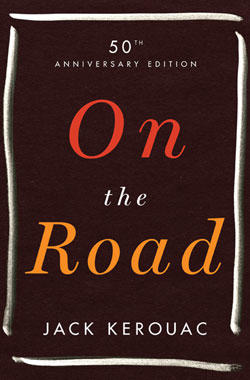Today is the 50th anniversary of the publication of Jack Kerouac’s “On the Road,” a fictional autobiography inspired by Kerouac’s travels throughout the country. Kerouac struggled to find his place in postwar America and eventually rejected the cultural and social norms of his era, according to his biography on biblio.com. Kerouac conveyed this attitude through his stream-of-consciousness rhetoric, which was purposefully spontaneous and non-conformist. He shared this style with several of his contemporaries, such as William S. Burroughs and Allen Ginsberg. The three are now known as the “Beat Generation,” a term Kerouac created. Kerouac’s influence was widespread and defeated the confines of time, and as Daniel Williams, chairman of the English department, said, the novel is an icon of American culture. His prose style shaped the works of many writers that followed, such as Tom Robbins, Lester Bangs and Richard Brautigan. Musicians who borrowed inspiration from Kerouac include The Beatles, Bob Dylan, Simon and Garfunkel, Morrissey and Jim Morrison.
A social group called “Beatniks” emerged who, according to a 1950s San Francisco Chronicle columnist who coined the term, are anomalous compared to mainstream society and probably pro-communism. Although Herb Caen grossly generalized the Beatniks through his stereotypical mockery, thousands of youth in college and high school campuses proudly called themselves Beatniks.
The Beatnik lifestyle became the underlying foundation of a number of countercultural groups that followed Kerouac’s time, such as hippies and punks.
The New York Times reported in an Aug. 15 article that 100,000 copies of “On the Road” are sold every year, partially because many high schools and universities teach the novel. TCU has offered courses that teach Kerouac in the past, however, none of them are being taught this semester, Williams said.
Kerouac has also made his mark on various members of the university.
From: Sociology professor Michael Katovich
Jack Kerouac was one of many post-World War II drifters who took to the road to find time and space. The road is a key metaphor in American culture in that we associate it with creation and transformation. Our nation began as interconnected bodies of water through which we navigated with various boats. As we built our culture and society, we also built our roads. The road represents the creation and re-creation of time, space and the self. Kerouac caught the representation in a unique way, as a drifter who, with the help from his friends, especially Dean Moriarty, establishes purpose. Kerouac and the “beat movement” became known as a purposive alternative – one that could entwine a new ethic of drift with a more traditional ethic of mission. Kerouac and Moriarty transform the landscape into their own quest to find the inverted corners of the American Dream.
From: English graduate instructor John Burkett
During my undergraduate years, I neglected my textbooks and read the authors who could instruct and speak to my formless soul. When I was a junior, I discovered Jack Kerouac. One whole morning I spent alone with Kerouac, sitting, standing and excitedly walking around campus as he spoke to me from his soul. He was not a famous, $1,000 professor, but he had written $5 novels in the 1950s, and I preferred his company. The beatnik author seemed to know my experience and longings, and his stream-of-consciousness style in “On the Road” probed the depths of human nature in a way my textbooks would never attempt.
From: Director of Admissions for the Brite Divinity School Stan Hagadone
I first encountered “On the Road” as a teenager in a small town in Central Texas and it awakened me to possibilities that extended beyond the narrow confines of my provincial existence. I was moved by the sense of exhilaration and freedom expressed by Sal Paradise and Dean Moriarty and their openness to new experiences. From a personal standpoint, the most lasting impact of the novel was the way it led me to other “Beat” writers such as William S. Burroughs, Lawrence Ferlinghetti and Allen Ginsberg and to an appreciation of modern jazz that continues to this day. My hope is for a new generation of novelists and poets who will again question authority and demonstrate the ability of the individual to transcend social conformity.
From: Director of International Student Services John Singleton
For me, Jack Kerouac is impossible to dismiss, from his early days in Lowell, (Mass.) to his last years in Big Sur (Calif.) and back east. He broke into our atmosphere, a piece of interstellar debris, and if in the literary world his stream of consciousness would become its own form, it was mimicked in the world he inhabited by his actions, at times shining and at other times wretched and tragic. “On the Road” is a ship’s log and at the same time a treasure map, and anyone who has ever taken a “road trip” has participated in something that not only goes forward but also backward, past Kerouac and Dante and Cervantes, all the way to Homer. What Kerouac did was simply translate those works into a language being spoken by a new generation.




